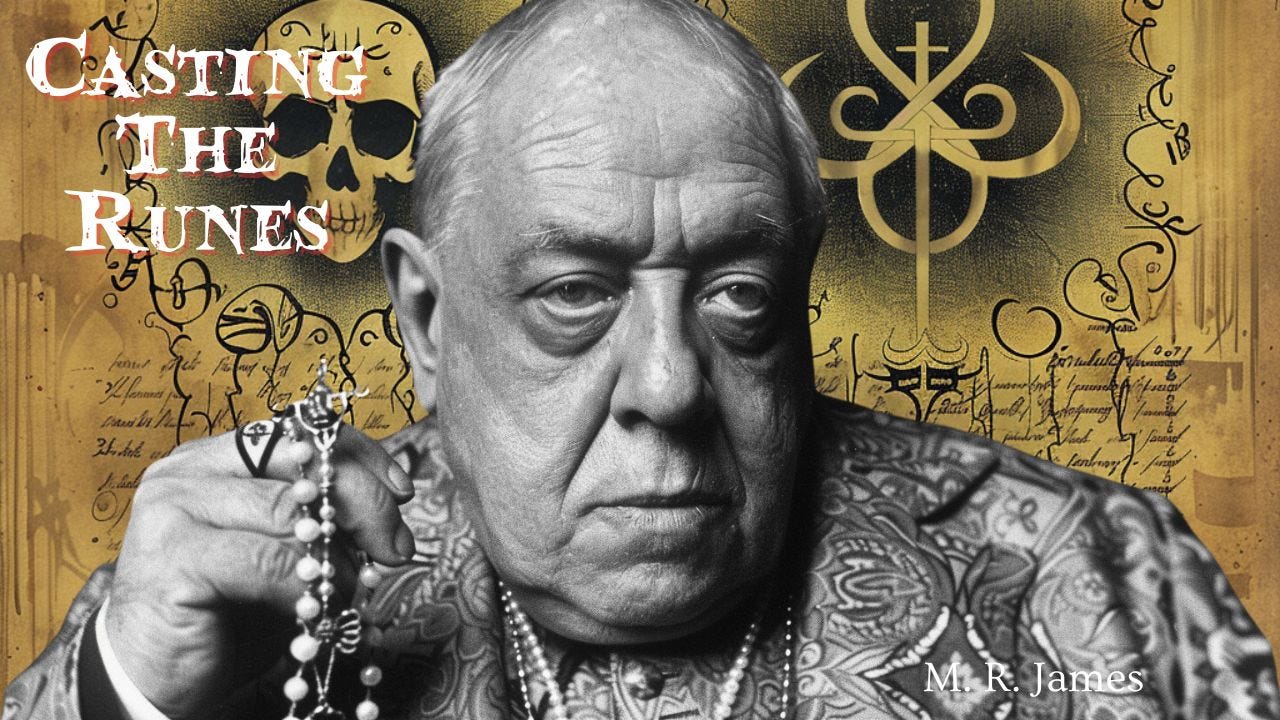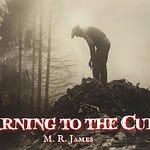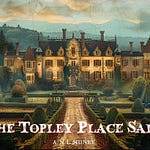M.R. James (1862-1936) was an English author, medievalist scholar, and provost of King's College, Cambridge. Best known for his ghost stories, which are widely regarded as among the finest in the genre, James redefined the traditional ghost story by abandoning many of the formal Gothic clichés of his predecessors and using more realistic contemporary settings. His stories often reflect his academic background, with the protagonist being a scholar or antiquarian.
"Casting the Runes" is a short story by M.R. James, first published in 1911 as part of his collection "More Ghost Stories." The story tells the tale of Edward Dunning, a researcher who crosses paths with a vindictive occultist named Karswell. Karswell seeks revenge by cursing Dunning with a slip of paper containing runic symbols, which will cause his death unless he can pass the curse back to Karswell. The story has been adapted several times for television and film, most notably as the 1957 movie "Night of the Demon" (released in the US as "Curse of the Demon"), directed by Jacques Tourneur and starring Dana Andrews and Niall MacGinnis.
The structure of "Casting the Runes" is somewhat unconventional, with the narrative shifting focus between various characters and events. The story begins with a series of letters, followed by a conversation between the Secretary and his wife about Karswell. The lunch scene where Harrington's death is mentioned serves to introduce the main protagonist, Dunning. The spotlight then shifts to Henry Harrington, the brother of the deceased, as he aids Dunning in understanding the curse. The Secretary makes another appearance before the climactic scene on the train, where Dunning manages to pass the rune back to Karswell. This uneven structure contributes to the story's sense of unease and unpredictability.
Many have noted the similarities between the fictional character Karswell and the real-life occultist Aleister Crowley (1875-1947). Both were deeply involved in the study and practice of the occult, had a reputation for eccentricity and mischief, and authored numerous works on alchemy and magic. While James never explicitly stated that Crowley was the inspiration for Karswell, the physical description of Karswell in the story bears a resemblance to photographs of Crowley from the early 20th century. It has been suggested that James, who was at Cambridge during Crowley's time there, might have met or been aware of the young occultist. Crowley enrolled at Trinity College, Cambridge in 1895, during James' tenure at King's College. Although there is no direct evidence of a meeting between the two, it is plausible that James, who was known to interact with students, might have encountered or heard about the flamboyant and controversial Crowley.
The idea of cursing someone by giving them a piece of paper or a "black spot" has roots in various occult practices throughout history. In ancient Rome, curse tablets known as defixiones were used to invoke the power of gods or spirits to bring misfortune or harm to an enemy. These tablets were often made of lead or other metals and inscribed with the name of the intended victim and a formula of curses. The tablets were then typically buried or deposited in a place associated with the underworld, such as a grave or a well. The Roman Baths in Bath, England, have yielded a large number of these ancient curse tablets, attesting to the prevalence of this practice.
At its core, "Casting the Runes" is a story about the consequences of offending a narcissist and the lengths to which such an individual might go to exact revenge. Karswell's fragile ego and vindictive nature are the driving forces behind the curse he places on Dunning, who unknowingly slighted him by criticizing his work. The story serves as a cautionary tale about the dangers of crossing those with inflated senses of self-importance and the potential for seemingly minor actions to have far-reaching and deadly consequences. James' masterful storytelling and his ability to create an atmosphere of mounting dread have solidified "Casting the Runes" as a classic of the horror genre, one that continues to resonate with readers over a century after its publication.














Casting The Runes by M. R. James